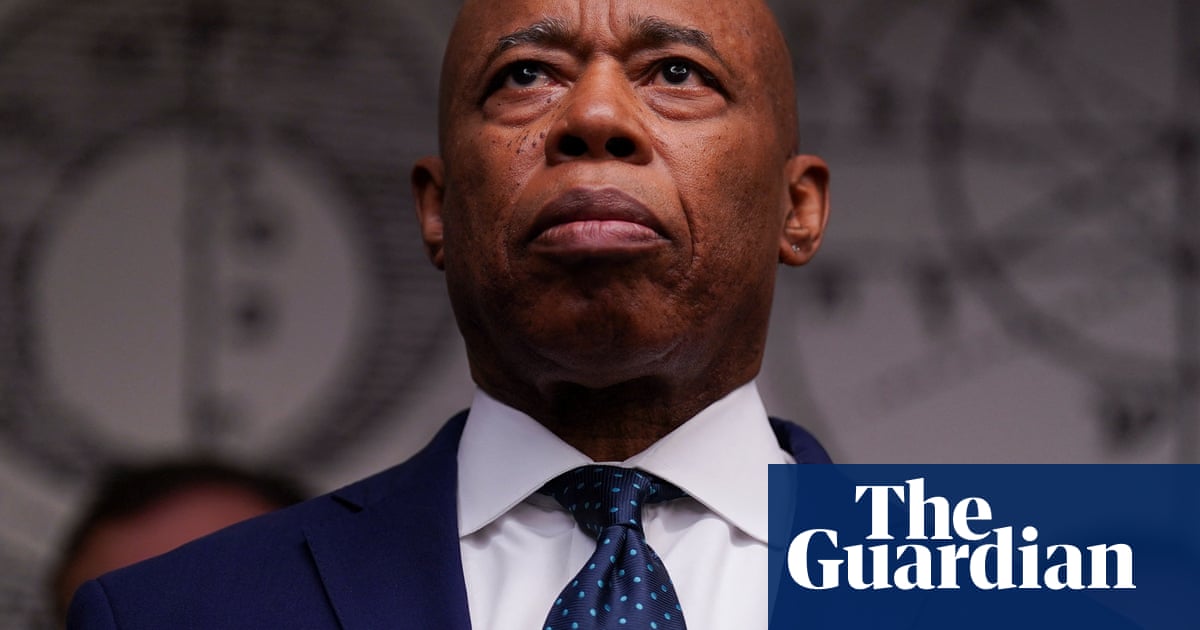Eric Adams, the mayor of New York City, signed an executive order this week adopting a controversial definition of antisemitism, asIsrael’s invasion of Gazaand alleged antisemitism continued to dominate the city’smayoral election.
The mayor signedthe order, which requires city agencies to use the International Holocaust Remembrance Alliance’sdescription of antisemitism, at a synagogue in Manhattan on Sunday. Adams described antisemitism as “a vile disease that’s been spreading across our nation and our city”.
Critics of the definition say it is designed to protect Israel by punishing legitimate criticism. Examples of antisemitism that accompany the formal definition include “claiming that the existence of a state of Israel is a racist endeavor” and “applying double standards by requiring of [Israel] a behavior not expected or demanded of any other democratic nation”. The lead author of the definitionhas spoken outagainst its use to suppress free speech.
The move comes two weeks ahead of the Democratic primary forNew YorkCity mayor, where a number of high profile candidates are running against Adams. Support for Israel and the city’s Jewish population has become a key issue, with the frontrunners holding starkly different views on Israel’s war on Gaza.
Adams, adeeply unpopularfirst-term mayor whose time in office has been blighted byaccusations of accepting bribes, has positioned himself as a staunch defender of Israel as he seeks to win election. He referenced therecent murderof two Israeli embassy staff members in Washington and theattack on a crowdof people in Colorado who were raising awareness for Israeli hostages in Gaza before signing the order.
“Since Hamas’ terror attacks on October 7 2023, we have seen this hateful rhetoric become normalized on our campuses, in our communities, and online as antisemitic propaganda far too often masquerades as ‘activism’. When Jewish New Yorkers make up 11% of the population but more than half of all hate crimes, we know this moment demands bold, decisive action to crack down on anti-Jewish hatred,” Adams said.
Antisemitic and Islamophobic violencehave risensince the Hamas attack and Israel’s response, and Adams has criticized pro-Palestinian demonstrations which have taken place on university campuses and around the city.
Adams was elected as a Democrat, but is running as an independent candidate in this year’s election. His main rivals are Andrew Cuomo, the former governor of New York whoresigned in 2021amid accusations of sexual harassment, and Zohran Mamdani, a New York state representative.
In 2021, Orthodox Jewish support helped Adams win the Democratic primary, but with Cuomo, Adams is up against a fellow staunch supporter of Israel. Last year, Cuomojoined Benjamin Netanyahu’s legal defense teamafter the International Criminal Courtissued an arrest warrantfor the Israeli prime minister for alleged war crimes in Gaza.
Mamdani, a Democratic socialist who has long been outspoken on Palestinian rights,has describedthe situation in Gaza, where Israel has killed more than 50,000 people, as “genocide” and said he would have Netanyahu arrested if he came to the city.
Adams signed the executive order at a synagogue in Manhattan on Sunday. He thensat for a discussionwith Phil McGraw, a television personality and Trump supporter, about the threat of antisemitism, in which he criticized anti-Israel demonstrations at universities.
